Fruits of the sea
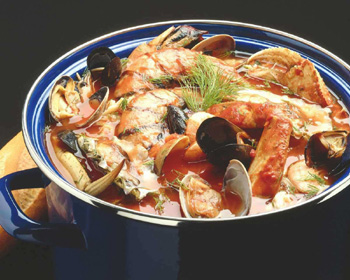
Seafood is growing in the Irish market, echoing the growing demand worldwide, and it is forecast that this demand will not be slowing any time soon
12 September 2008
At a glance: seafood
- The National Development Plan (NDP) 2007 – 2013 has allocated €216 million for the fisheries sector
- Irish fisheries will receive EU funding of €42.2 million from the European Fisheries Fund (EFF)
- Overall investment in Irish fisheries for the seven year period 2007 – 2013 will total €597 million
- BIM predicts China alone will consume 190 million metric tonnes of seafood by 2015 – almost 70 million metric tonnes more than the entire global supply of 2005
- Total world mussel production reached two million tonnes in 2004 (Inshore Ireland)
- Between 1994 and 2004, the average growth worldwide of farmed mussel production was 6.6% per annum, which is half that of the average growth of world seafood production, which is estimated at approximately 13% per annum (Inshore Ireland)

Demand for seafood worldwide will continue to increase and drive up prices
On a global level, demand for seafood is driving up prices and looks set to increase dramatically as major markets emerge. At a recent conference held by the Irish Sea Fisheries Board, BIM, it was projected that China alone will be consuming 190 million metric tonnes of seafood by 2015, which represents almost 70 million metric tonnes more than the entire global supply of 2005.
In Ireland, consumers are turning to higher value seafood products, for instance choosing wild over farmed, and are prepared to pay more for the perceived premium proposition. A BIM report on the Irish seafood import trade revealed that, “as in other European countries, demand in Ireland for consumer-ready and convenience products continues unabated.”
Similarly, a report on ‘Fish and Seafood’ by market analyst Mintel found the industry is “enjoying strong growth, benefiting from the consumer’s focus on healthy eating, convenience, and the increasing ‘sexiness’ of home cooking.”
Convenience products such as seafood based ready meals and the more traditional breaded and battered fish products exhibit continued strong demand and market growth, especially canned tuna, which is the largest single product component of Irish seafood imports and is still rising. Meanwhile in the whitefish category, imports mainly comprised cod in frozen whole and fillet form. However, the Mintel report also stated that pre-empting threats on the horizon is paramount in continuing the success of the fish and shellfish industry. These threats centre on concerns for the health of fish stocks as well as the damage that some invasive methods of fishing cause. Mintel states “more and more retailers are setting sustainable sourcing policies” to which suppliers must increasingly conform.
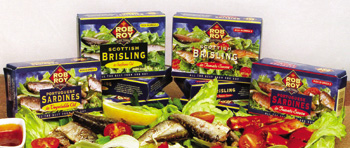
Rob Roy’s tinned fish range includes Rob Roy Sardines and Rob Roy Brisling, both available in oil or tomato sauce

Rob Roy’s tinned fish range includes Rob Roy Sardines and Rob Roy Brisling, both available in oil or tomato sauce
An ocean of goodness
The Rob Roy range of prawns and tinned fish fit perfectly with consumers’ increased demand for healthier and more natural foods and are a great way to easily incorporate Omega three fatty acids into any diet. Omega three currently has a high profile in consumer media; nutritionists recommend people eat food containing Omega three, poly-unsaturated fatty acids at least twice weekly. Omega three has been proven to contribute towards a healthy heart and body by protecting against coronary heart disease.
Rob Roy prawns are an excellent source of protein and also contain iron, zinc and vitamin E. They are quick and easy to cook, whether steamed, boiled, fried, grilled, baked or barbecued. The Rob Roy range of tinned fish includes Rob Roy Sardines, available in oil or tomato sauce, and Rob Roy Brisling, available in oil or tomato sauce. Both are ideal for serving on crackers and bread, in a pasta dish, or used as a pizza topping.
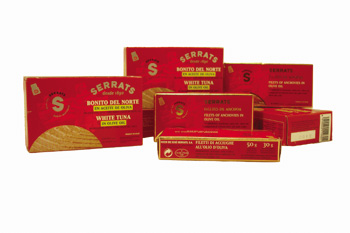
The José Serrats range includes Bonito Tunain olive oil, Anchovies in olive oil and Gulas

The José Serrats range includes Bonito Tunain olive oil, Anchovies in olive oil and Gulas
Combining traditional methods and technology for top results
José Serrats established his business in Bermeo in 1890, with the desire to preserve and transport the freshness and flavour of the products of the Cantabrian Sea to the farthest corners of the world. The high quality of the fish helped him to implant new preservation techniques, especially from France, allowing his products to penetrate European markets rapidly.
After over 100 years in business, always combining the traditional methods of preparing the fish products using the most advanced industrial technology and strictest quality controls available, Hijos de José Serrats, S.A. are continuing his work; maintaining the trust of the most demanding national and international markets. The permanent selection of the best fish, oil and packaging used in the manufacturing process is accompanied by an unwavering commitment to present the product in a modern and attractive way that draws the attention of the end purchaser.
Groups oppose promotion of GM foods
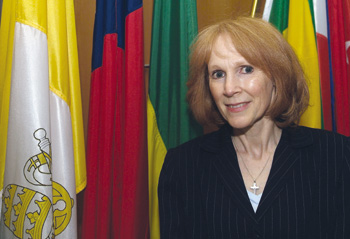
Kathy Sinnott MEP (pictured) and Euro-Toques support GM-Free Ireland’s position on genetically modified foods and its call for the government to ban the release of GM crops in Ireland and promote the use of certified non-GMO animal feed in the production of meat, poultry and dairyKathy Sinnott MEP (pictured) and Euro-Toques support GM-Free Ireland’s position on genetically modified foods and its call for the government to ban the release of GM crops in Ireland and promote the use of certified non-GMO animal feed in the production of meat, poultry and dairy
Groups belonging to the GM-free Ireland movement last month opposed Teagasc sponsorship of a biotechnology conference in Cork, over concerns it would promote genetically modified (GM) fish and other foods.
The movement said the conference entitled ‘Agricultural Biotechnology for a Competitive and Sustainable Future’ would promote GM algae, crops, trees, fish and livestock as a solution to rising food prices and climate change.
Chefs’ group Euro-Toques support the movement’s concerns, believing Irish chefs have an obligation to source the safe, healthy, quality produce “the majority of EU consumers want.”
“Any release of GM crops will contaminate our food chain in perpetuity, and destroy the brand reputation of ‘Ireland, the food island,’” said Lorcan Cribbin, commissioner general of Euro-Toques and head chef of Dublin’s Bang Café
In a press conference, Kathy Sinnott MEP and Michael O’Callaghan of GM-free Ireland called on the government to fund an independent conference on GM-free food and farming, to implement legislation to prevent the release of GM crops in Ireland, and to promote the use of certified non-GMO animal feed in the production of meat, poultry and dairy produce.
Attempting to solve mystery of low salmon stocks
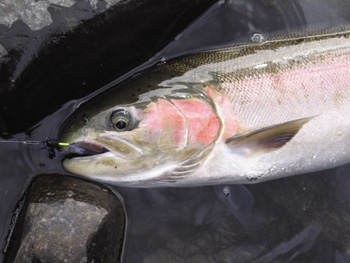
Stocks of wild salmon in southern Europe and the eastern seaboard of North America are critically endangered, possibly due to an increase in mortality at sea
The Total Corporate Foundation (TCF) has donated €200,000 to researchers trying to understand why salmon stocks are currently so low at sea. Fishing for wild salmon at sea has decreased over the past 40 years, yet salmon stocks have still declined dramatically across the north Atlantic, according to Peter Hutchinson of the North Atlantic Salmon Conservation Organisation (Nasco).
Stocks in southern Europe and the eastern seaboard of North America are described as critically endangered, with one possible explanation being an increase in mortality at sea. Nasco, which has a track record of supporting salmon-conservation in France, tried to solve the problem with a €5.5 million project in 2005, entitled Salsea (Salmon at Sea). This initiative involves 20 public, private and NGO partners investigating the decline. TCF is further supporting Nasco with a donation of €50,000 to an international genetics workshop organised as part of the Salsea programme, which agrees protocols for identifying the origins of salmon caught at sea.
Fishermen discontent over quotas
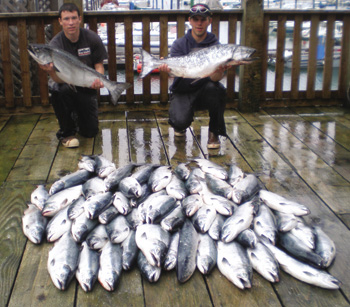
According to the European Commission’s 2009 statement of fishing opportunities, TACs are set too far above scientific advice to allow stocks to recover and, as a result, 88% of EU fish stocks are overfished
Irish fishermen have expressed discontent at “restrictive” fishing quotas. A new committee of 15, established after 300 fishermen met in Athlone in June, is pressing the government for urgent action on spiraling fuel costs and inadequate fishing quotas. David Kirwan, a fisherman from Louth, claimed that 40 vessels fishing off Dublin, had to dump a total of 45 tonnes of dead cod, worth €1million in the shops, back into the sea because they could not land anything above their restrictive quotas. "The vessels unintentionally caught four to six boxes of cod each day in their nets," said Kirwan.
Irish fishermen have complained for a long time that the opening up of Ireland’s waters gave ‘unfair’ fishing rights to other countries. For example, French vessels fishing in Irish waters are allowed eight times more monkfish than Irish vessels. However, some fishermen now admit quotas were flouted in the past, but say the authorities turned a blind eye to the widespread falsification of log book records. This means that scientific information about fish stocks could be based on inaccurate logbook records.
To address this issue, the Sea Fisheries Protection Authority (SFPA) was set up last year to police the industry and can bring criminal charges for breaches of the EU’s fishing rules. Irish fishermen have complained that the new authority is carrying out too few inspections on foreign vessels fishing in Irish waters. However, figures from the SFPA showed that 6.7% of Irish vessels landing fish in Irish ports were inspected last year, while 33% of foreign vessels landing fish in Irish ports were inspected.
The European Commission also underlines the importance of maintaining accurate quotas to promote sustainability. According to its 2009 statement of fishing opportunities, TACs (total allowable catch, according to which quotas are allocated) are set too far above scientific advice to allow stocks to recover and, as a result, 88% of EU fish stocks are overfished. Following an independent review published earlier this year, the fishing industry is said to be undergoing a radical overhaul.



 Print
Print

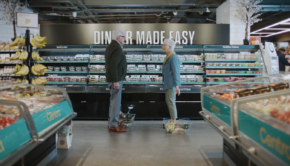

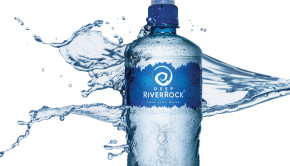
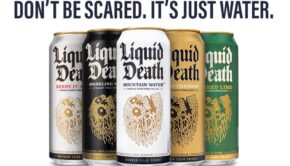

Fans 0
Followers